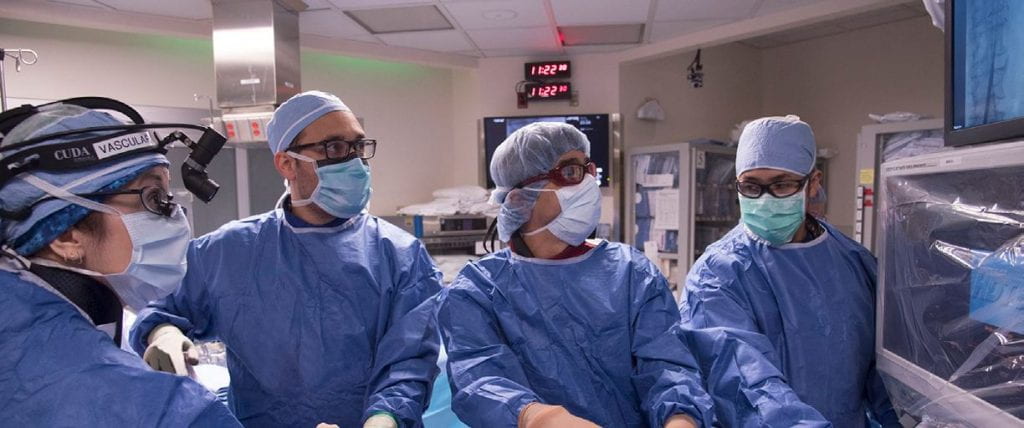
Specialized care for patients with thoracic aortic disease
The Center for Diseases of the Thoracic Aorta (CDTA) is a collaborative, multidisciplinary group of Washington University physicians at Barnes-Jewish Hospital who share interest and experience in treating diseases of the thoracic aorta.
The CDTA is dedicated to performing specialized evaluation and treatment for patients, while providing effective communication to keep the primary care physician completely informed of their progress.
We provide:
- Initial assessment and evaluation
- Surgical intervention (if necessary)
- Long-term surveillance in partnership with the primary care physician
Indications for referral:
- Acute and chronic aortic dissections
- Thoracic aortic aneurysms
- Marfan syndrome
The CDTA is dedicated to:
- Performing top-notch, specialized evaluation and treatment for patients with diseases of the thoracic aorta
- Providing effective communication to keep the primary care physician completely informed of the patient’s progress and returning patients quickly to the care of their physician
- Delivering centralized care at a single location, available with a single phone call
For more information, call 1-888-800-9484.
Thoracic aortic aneurysm
A thoracic aortic aneurysm (bulge in the wall of the thoracic aorta) is insidious and associated with a high risk of death if left untreated.
Natural history studies reveal:
- Rupture occurs in 70 percent of patients.
- Rupture results in a 94 percent mortality rate.
- Appropriate surgical therapy improves long-term survival.
The CDTA offers:
- Initial risk/benefit analysis of medical versus surgical treatment
- Evaluation for inclusion in the latest protocols for endovascular therapy
- Long-term surveillance to monitor aneurysm growth and determine the appropriate timing for intervention
Acute & chronic aortic dissections
Dissections (a disease process that occurs when the inner layer of the aorta’s artery wall splits open) involving the ascending aorta require emergency surgical intervention.
Dissections involving the descending aorta require intensive medical management and monitoring for life-threatening complications. Such complications may require surgical or endovascular therapy.
The CDTA offers:
- 24-hours-a-day, seven-days-a-week medical, surgical and interventional radiology services for immediate transfer and treatment of your patients
- The latest in endovascular stent-graft technology to treat high-risk patients
- A centralized, multidisciplinary approach to assist with the long-term surveillance of your patients following successful initial treatment
Endovascular therapy
Endovascular stent grafts offer a less invasive option for high-risk patients previously assessed as inoperable.
The CDTA offers:
- Physicians who have been at the forefront of the laboratory and clinical development of these promising devices
- Extensive stent graft experience with Luis Sanchez, MD, and his vascular surgery colleagues having successfully treated more than 350 patients with this new technology
- The opportunity for patients to be evaluated for inclusion in the latest stent-graft trials
Marfan syndrome
Marfan syndrome, a genetic disorder of the connective tissue, affects the aorta and its branches along with the heart, eyes and skeleton. Marfan syndrome features include tall stature, scoliosis (curvature of the spine), chest wall deformities, nearsightedness, lens dislocation and mitral valve prolapse.
Marfan patients are at high risk for aneurysm formation and aortic dissection.
The CDTA offers:
- Accurate diagnosis of Marfan syndrome by a multidisciplinary team of cardiologists, medical geneticists, ophthalmologists and cardiac surgeons
- Early treatment of Marfan syndrome patients with the goal of extending life expectancy into the 70s and beyond
- The experience and expertise of Alan Braverman, MD, medical director of the Marfan Clinic, and Alison Whelan, MD, medical geneticist, to coordinate the evaluation and management of your patients
CDTA specialists
Vascular surgeons
- Luiz Sanchez, MD, Chief
- Puja Kachroo, MD
- Patrick Geraghty, MD
- John Westley Ohman, MD
- Brian Rubin, MD
- Mohammed Zayed, MD, PhD